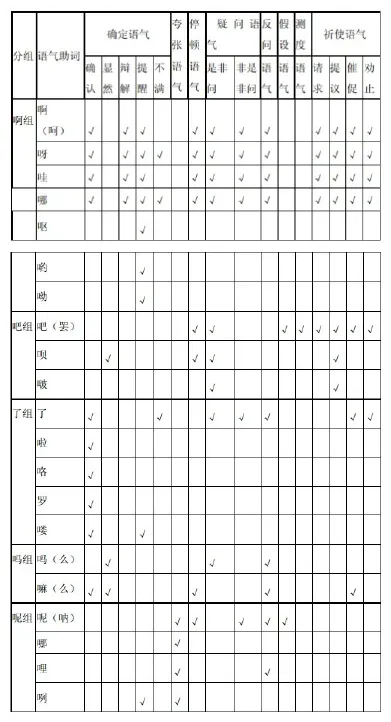The Difference of Modal Particles in Chinese and English
王 珏
The Difference of Modal Particles in Chinese and English
王 珏
By contrasting the modal particles between two languages—Chinese and English, we found that Chinese modal particles have no corresponding parts of speech in English. However, modal particle is one of the most effective means of expressing tone. Unlike English, the means and resources of Chinese to express interpersonal relationship are more abundant, subtle and complex. Therefore, with the help of proper use of Chinese modal particles, when the English works translated into Chinese, the translation can be more idiomatic and authentic.
For the natures of these two languages, they have very individual difference. As English moods expression more focus on the relation with real world, emphasizing on the distinction between the reality and non-reality. However,Chinese moods expression more focuses on communication target. English moods, tense, aspect and other grammatical categories are more closely intertwined, while Chinese are the opposite. English focus on analysis as well as comprehensiveness, with mood expression centering on the verb, on the other hand, Chinese mood expression is more flexible. English mood expression has more limitation. English language features tense, whereas Chinese language features aspect.
1.Introduction
(1)Research Background
A sentence actually contains two parts, one is the phenomenon that the sentence expressed, and the other is the cognitive means and the caller attitude towards the phenomenon, without changing the sentence. The later one mainly refers to sentence mood. In recent years, the mood of Chinese sentence has received more researchers’ attention. Especially for the near decades, the researches related to Chinese mood has been raised, and its depth and breadth have been developed as well. English linguistics are always concerned about English mood and modality. Even though its research has not been raised obviously like Chinese, the outcome of research is abundant in the recent three decades.
Contrastive linguistics research in recent year has been rapid developed. Chinese contrastive study from the late 1970s gradually developed since the research is also rather rich. However, the microscopic study based on the 1980s,pronunciation, vocabulary, grammar has expanded since the 1990s after influenced by the sentence group, discourse,rhetoric, style, language, cultural and other levels of study. It is unfortunate to see that the two languages researchers have the increasing interest in the perspective of languages mood system, but comparative studies about Chinese and English language mood system is always less patronized by the researchers.
Relatively speaking, the results of research in this area are indeed not very encouraging. A considerable part of the comparative study involving mood and modality have not well-developed, the contrasts are far more than enough and careless. This report tries to do a more in-depth comparative study on Chinese and English two languages mood system. Thus, adopt this method to translate English works, with the help of Chinese modal particles.
(2)Figures and Tables
According to the function of Chinese modal particles Fang Yuqing provides a table below:

2.Method
(1)Mood expressing in English
The term “mood”, in The New Oxford Dictionary of English, actually means a category of verb use, typically expressing fact, command, question, and wish or conditions the indicative/imperative/subjunctive mood. In all languages,intonation is crucial when it comes to expressing mood. In English, Intonation is no exception, a great to express mood. There are some other factors, other than intonation, wouldinfluence the reproduction of the mood as well. Have a close look at the example below which is given by Halliday:
E.g. The duck’s given away the teapot, hasn’t he?
_Oh, has he?
_yes, he has.
_No, he hasn’t!
_I wish he had.
_He hasn’t; but he will.
_Will he?
In this example, the component “give away the teapot”is called the remainder, which is isolated and remained unchanged with the different rhetorical changes. However, the last part of the sentence is able to be bandied about is known as mood. Usually, mood has two important components, which are the subject and the finite element. In this case, “he” the person is the subject, and “has”, “hasn’t”, “had”, “will”are the finite that are all verbs, showing modality through different tense.
Moreover, mood can be influenced by some other factors as well, for instance, mood adjuncts, comment adjunct and vocative adjuncts. Mood adjuncts consist of Adjuncts of polarity and modality, adjuncts of temporality and adjuncts of mood .
Therefore, it can be clear to tell that, in English, mood is generally influenced by these components, which are intonation, the subject, the finite element, mood adjunct,comment adjunct and also vocative adjunct.
(2)Mood expressing in Chinese
In Chinese,“语气”(mood), in 现代汉语词典(The Contemporary Chinese Dictionary), has two meanings. 1) 说话的口气。(tone); 2) 表示陈述、疑问、祈使、感叹等分别的语法范畴。(It indicates the grammatical category such as declarative, interrogative, imperative and also exclamative.)
According to contemporary Chinese Grammar works,Chinese modal particles can be divided into four categories.
declarative: 了(le), 的(de), 嘛(ma), 呢(ne), 罢了(ba le), etc.
imperative: 吧(ba), 啊(a), 呀(ya), etc.
interrogative: 吗(ma), 呢(ne), 吧(ba), 啦(la), etc.
exclamative: 啊(a), 哟(you), 呀(ya), etc.
In Chinese, according to according to Xu Jingning (2000), there are six major means to express mood: intonation,modal particles, interjections, modal adverbs, syntactic patterns, and also selection of synonyms. Take a close look at the given example below:
约翰不来?(John won’t come over?)
约翰不来吗?(John won’t come over?)
约翰难道不来吗?(John won’t come over?)
约翰难道不来吗?啊?(John won’t come over? )
The first sentence, the mood is expressed by intonation. The second sentence, the mood is expressed by intonation and modal particle. The third sentence, the mood is expressed by intonation, modal particle and modal adverb. The fourth sentence, the mood is expressed by intonation, modal particles, modal adverb, and interjection. This example clearly shows that for English has no equivalent lexical items to Chinese modal particles, it uses intonation. However,intonation can be visible on paper, with the help of the modal particles.
3.Results
There are three principles can be followed to translate English works into Chinese, by applying modal particles. First and foremost, the categorization principle refers to a certain type of English sentence translated into Chinese sentence,using proper modal particles. For English and Chinese sentence classification is quite similar. Such as statements,English translated into Chinese, we can use modal particles了(le), 的(de), 嘛(ma) etc. For example, “look! This puppy is so cute!” “看啊!这只小狗真可爱啊!”
Second is personalization principle. The human personality is decided by its physical characteristics, family and social environment, roles and status, cultural enrichment and other various factors. Under normal circumstances, the human personality and their tone of voice, and indeed there is some kind of internal connection. When you are doing translating, it is necessary to choose the appropriate modal particle according to the personality of the speaker to be fully demonstrated.
Third is the situation principle. This principle means:different occasions, the mood state or to different target audiences, the tone of speech would be different. Talking in public or privately, the mood is not the same, so is being angry or happy. In front of superiors, elders, subordinates and juniors, well-educated, sensible, outrageous or arrogant people, the mood must be expressed differently. For instance,“now return to the nursery, my dear, and lie down a little.”“好了,亲爱的,回儿童室去吧,去躺会儿吧。” This translation by adding two modal particles 吧(ba) makes the tone of speech softer.
4.Conclusion
In Chinese mood system, one of the vital significant ways to expressing mood is that Chinese modal particles. Nevertheless, in English, there are no correspondence terms to Chinese modal particles. The meanings of Chinese modal particles are isolated. Therefore, to look into the appropriate adoption of Chinese modal particles in English to Chinese translation is a great experience.
作者单位:(浙江商业职业技术学院)

